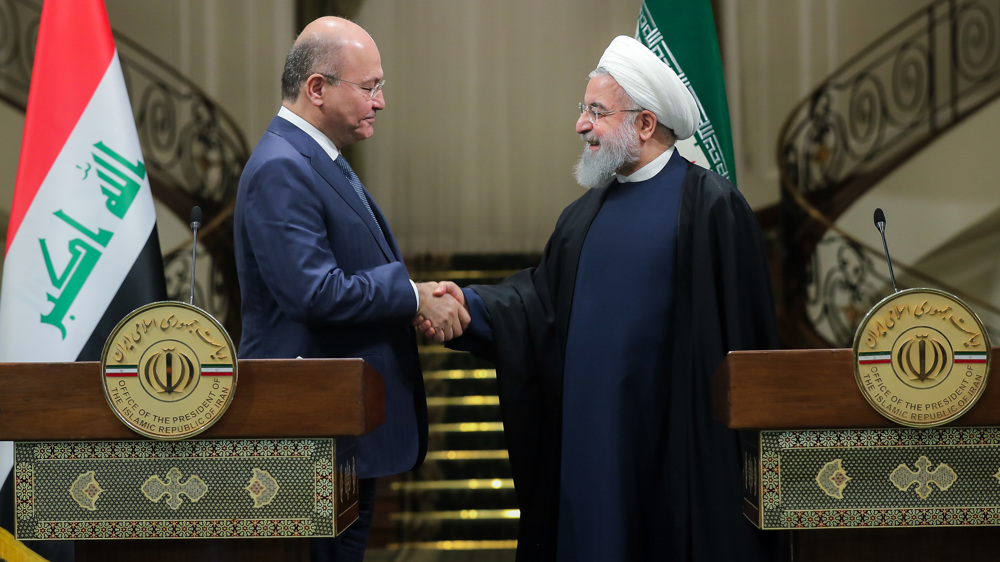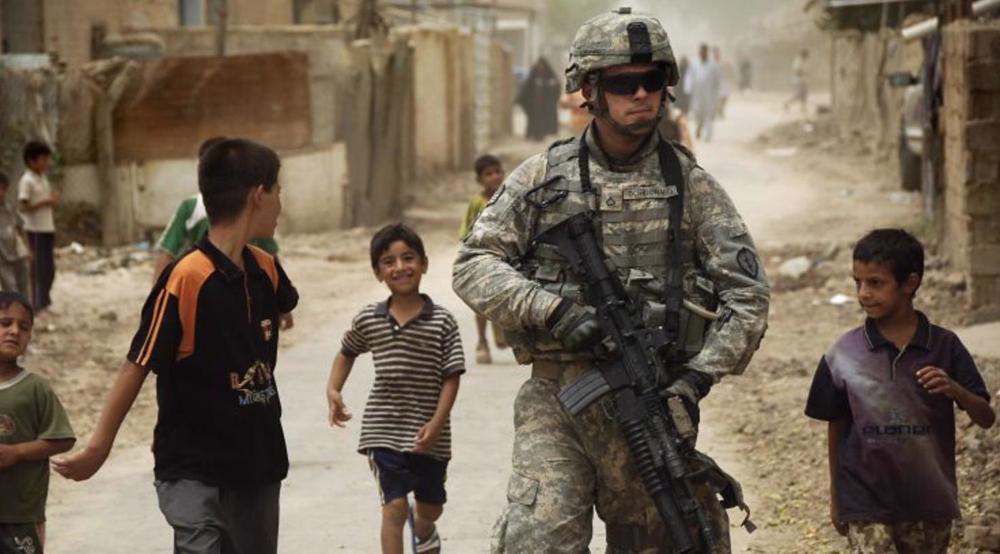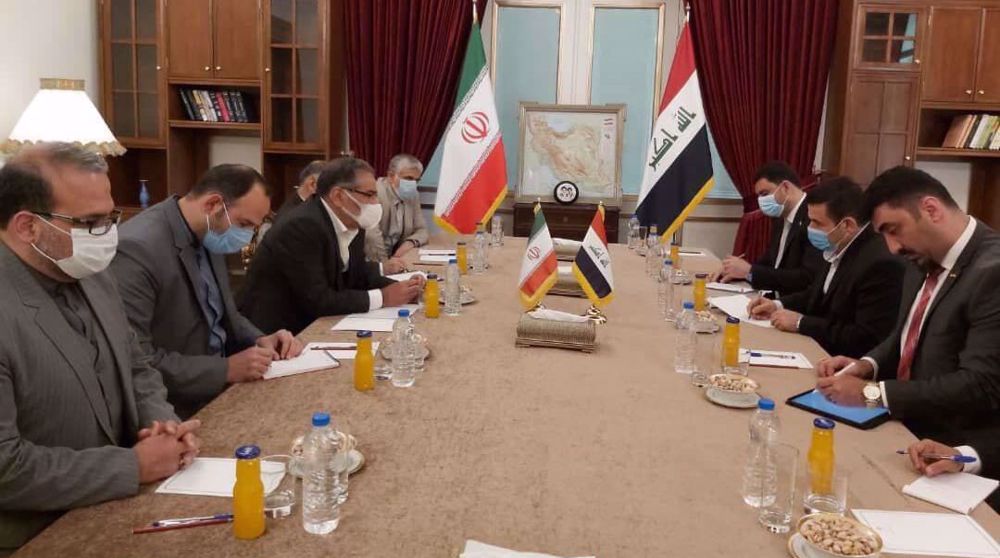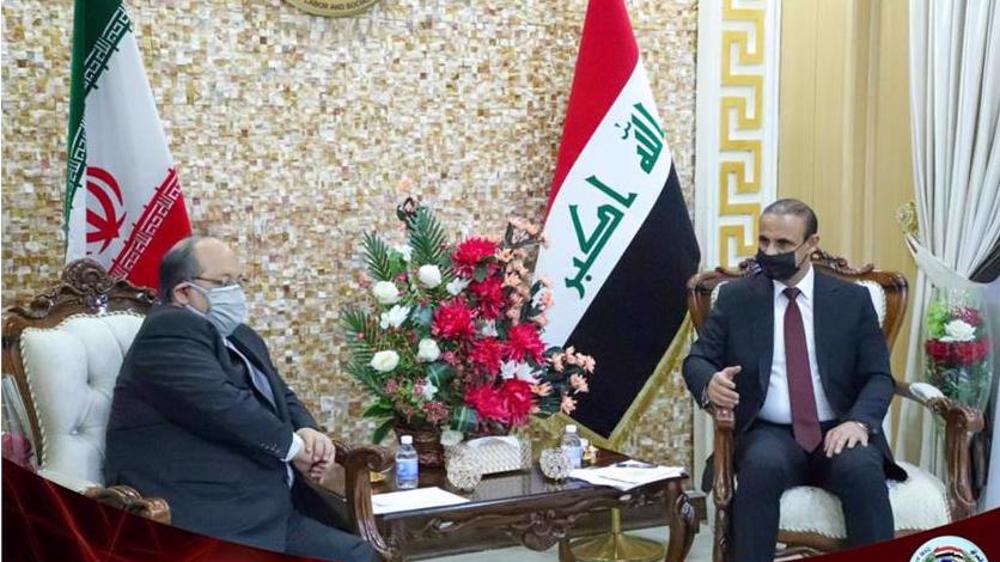Iran's Rouhani questions US presence in region, says regional countries well capable of ensuring own security
Iranian President Hassan Rouhani has censured US presence in the region, saying the American forces have not contributed to security but rather played a “destructive” and meddlesome role in regional affairs.
Speaking on the phone with his Iraqi counterpart Barham Salih on Wednesday, Rouhani described US activities on the Iraqi-Syrian border as “ambiguous” and said, “The Americans have always played a destructive role in the region, and the presence of American troops in the region has not helped establish peace and stability.”
He described Iraq as a good friend and neighbor of Iran and rejected any foreign interference in the Arab country’s affairs.
“We regard the security of Iraq as that of our own. We oppose any foreign interference in Iraq’s internal affairs and consider it to be to the detriment of this country and the entire region and we believe that the security of the region should be maintained by the countries of the region themselves,” he noted.
The Iranian president voiced the Islamic Republic’s support for the stability, security, independence and territorial integrity of Iraq, and said strengthening the dignity, authority and independence of Iraq and promoting the regional and international status of this country are of special importance to Iran.
Also in his remarks, Rouhani underlined the need for further promotion of relations between the two countries in all fields, especially economic and trade cooperation, and said by developing their bilateral and regional cooperation, Tehran and Baghdad can play an important role in regional developments and be influential.
Emphasizing the need to speed up the implementation and operation of previous agreements, including the Shalamcheh-Basra railway project and the connection of the two countries' railways, Rouhani said given their economic potential as two complementary economies, Iran and Iraq can develop cooperation and increase the volume of trade relations and exchanges through boosting transit as well as goods transportation.
For his part, the Iraqi president hailed relations with Iran as “strategic and growing” and called for strengthening and consolidating relations in all fields, especially economic and trade relations in the light of the long-standing cultural and historical commonalities between the two countries.
“The Iraqi government is determined to seriously pursue and implement all agreements in various fields between the two countries, which will be to the benefit of both countries and the region,” Salih said.
He also stressed the importance of establishing peace and stability in the region and the cooperation of all neighboring countries to that goal.
"The decision of the Iraqi government to end the presence of foreign troops in this country is serious. In this regard, strategic and constant negotiations have been held with the Americans, which will continue until an ultimate result is reached,” he said.
On January 5, 2020, Iraqi lawmakers approved a bill demanding the expulsion of all foreign military forces led by the United States from the country two days after the assassination of General Qassem Soleimani, the commander of the Quds Force of Iran’s Islamic Revolution Guards Corps (IRGC), along with Abu Mahdi al-Muhandis, the deputy head of Iraq’s Hashd al-Sha’abi, and their companions in a US strike targeting their vehicle outside Baghdad International Airport.
The United States and Iraq announced in a joint statement last week that they have agreed on the withdrawal of all American combat troops from the Arab country but the two sides did not set a timetable.
Later, Iraqi military spokesman Brigadier General Yahya Rasool said Iraqi Prime Minister Mustafa al-Kadhimi had ordered the formation of a committee that would hold technical talks with the US side to approve “mechanisms and timings” related to the redeployment.
The US, which invaded Iraq in 2003, withdrew forces from the Arab country in 2011 under the "US–Iraq Status of Forces Agreement" but former US president Barack Obama redeployed them in 2014 under the so-called US-led coalition forces to purportedly help eliminate the terrorist group of Daesh.
In his final months in office, Obama’s successor Donald Trump ordered a drawdown from Iraq as well as Afghanistan, with the number of US troops in each country dipping to 2,500 by January 15.
The announcement came as US targets in Iraq came under frequent rocket attacks amid rising anti-US sentiment in the country.
The US has also military bases in Syria and maintains forces in the eastern and northeastern parts of the Arab country.
The Pentagon claims that the troops deployment are aimed at preventing the oilfields in the areas from falling into the hands of Daesh Takfiri terrorists.
The Syrian government, however, says the deployments are meant to plunder the country's resources.
Russia downs over 40 Ukrainian drones as Putin vows 'destruction' on Kiev
VIDEO | Yemen: A bone in Israeli neck
D-8’s role in Iran’s economy after Cairo summit
China slams US as ‘war-addicted’ threat to global security
China ‘firmly opposes’ US military aid to Taiwan
VIDEO | Press TV's News Headlines
President Yoon Suk Yeol to be removed from office
At least 19 Gazans killed by Israeli airstrikes since dawn: Medics













 This makes it easy to access the Press TV website
This makes it easy to access the Press TV website